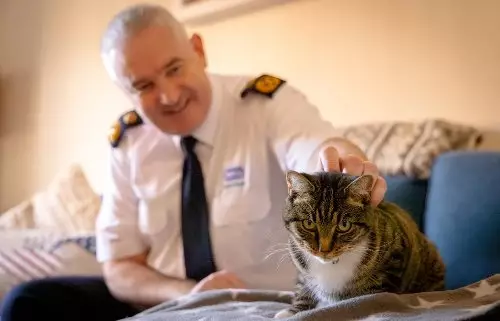The RSPCA has recently reported a distressing trend in animal abandonment cases, revealing a staggering three-year high that highlights the urgent plight of countless pets. As of late October this year, the charity documented 17,838 individual reports of abandoned animals. If this troubling trajectory continues, 2023 could witness a total exceeding 21,000 abandonment reports, a sharp increase from the 16,118 recorded throughout 2020. This marks a concerning increase of approximately 32.9% in the number of abandonment calls, surpassing the totals from both 2021 and 2022.
The situation has amplified concern among animal welfare advocates as reports illustrate a growing crisis around the welfare of abandoned pets as winter approaches. Last October alone, the RSPCA received 1,800 calls regarding incidents of abandonment, significantly eclipsing the figures from previous years. In fact, this number reflects a 48.1% increase compared to the same month in 2020, underscoring how the issue has worsened in a relatively short time frame.
Underlying Causes of the Crisis
The current spike in abandonments can largely be attributed to the looming cost of living crisis, which has unfortunately intersected with an unprecedented increase in pet ownership during the COVID-19 pandemic. Dermot Murphy, RSPCA’s inspectorate commissioner, describes the situation as a “perfect storm” for animal welfare, noting that the compounded effects of economic strain and the surge in pet adoptions during lockdowns have created an increasingly dire scenario for many animals.
Many families, led by their well-meaning intentions, adopted pets to alleviate the isolation felt during lockdowns, only to find the burdens of caring for these animals overwhelming during periods of economic downturn. Pets that once represented companionship and comfort are now seen as additional financial responsibilities that many can no longer afford.
While the statistics are indeed alarming, they merely scratch the surface of the harrowing realities behind each case of abandonment. Each report represents a unique story involving a vulnerable creature that has been cast aside, often leading to traumatic experiences for the animals involved. RSPCA rescue teams report that increasingly, they are encountering animals in horrific conditions, abandoned without food, shelter, or love.
One poignant example shared by the charity involved a mother and daughter cat duo, Sheila and Stella, who were discovered in deplorable conditions, malnourished and desperate for help. After being rescued by RSPCA inspector Amy Pellegrini, these cats went on to find a loving home, highlighting a glimmer of hope amid the bleak statistics. Stories like theirs exemplify the transformative power of compassion and community support in animal rescue.
Crisis Ahead: The Urgent Need for Support
As the winter months approach, the RSPCA prepares for what they term an unprecedented winter crisis. With animal rescue centers nearing capacity, the stakes are high. The charity is appealing to animal lovers and the general public for generous donations, reiterating the critical need for resources to manage the increasing number of animals in desperate need.
Dermot Murphy’s call to action is not just a plea for financial support; it is a rallying cry for animal lovers to join in solidarity against the mounting crisis. He emphasizes that their capability to save lives is directly linked to the collective effort of individuals who care about the welfare of animals.
In response to the growing challenge, there are various ways individuals can contribute to combat this heartbreaking trend. Donations, whether monetary or in the form of food and supplies, can make a significant difference for rescue organizations struggling to manage increased numbers. Volunteering your time at local shelters or fostering animals in need can also provide immediate relief.
Furthermore, spreading awareness about the importance of responsible pet ownership and long-term commitment to animal care can help curb future abandonment rates. By educating communities about the financial and emotional responsibilities that come with pet adoption, the instance of abandonment could be reduced over time.
As we face a harsh winter during a time of economic uncertainty, it is vital to remember that every number in these reports reflects a life that deserves care, respect, and love. The RSPCA’s mission to safeguard and nurture animals requires a united front from individuals who hold a deep-seated value for animal welfare. The growing abandonment crisis is a shared responsibility and recognizing the need for immediate action is crucial. Only through community engagement, education, and compassion can we hope to reverse this troubling trend and ensure that no animal faces abandonment alone.


Leave a Reply